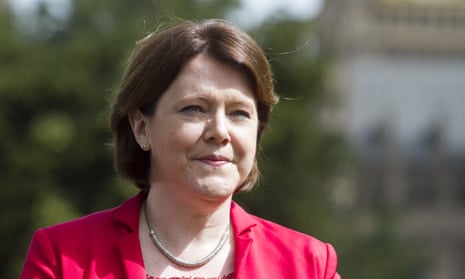Gender-related hate crime has been given second-class status while sexist behaviour online, in the street and in the classroom has been going unchallenged, according to Maria Miller, who chairs the women and equalities select committee.
The warning from the Tory former cabinet minister comes after the Nottinghamshire chief constable, Sue Fish, spoke in depth for the first time about the force’s pioneering policy to recognise misogyny as a hate crime.
Miller, whose committee has most recently been taking evidence on the sexual harassment of girls in schools, hailed the Nottinghamshire pilot, but she warned: “While progress has been made in sensitising people to the issue of racial and religious hate crime, it seems to me that gender-related hate crime has taken on second-class status.”

Nottinghamshire police, in partnership with Nottingham Women’s Centre, has become the first force in the country to record harassment of women as a hate crime. The change began in May after a public summit last autumn at which women explained how unsafe they felt on the streets. And there have been some encouraging results since, with supporters hoping the Nottinghamshire policy could be taken up by other police forces around the country.
“Listening to women’s experiences, they felt that they weren’t going to be taken seriously and then had mixed experiences if they did report. For both those who take the calls and the officers who respond to them, [the new policy] is giving a clear position,” Fish told the Guardian.
Previously police knew the procedure when it was “indecent assault or a public order offence … But if it’s at the lower end, officers would have lots of empathy with the women but were not quite sure what they could do,” she said. The force now defines misogyny hate crime as: “Incidents against women that are motivated by an attitude of a man towards a woman and includes behaviour targeted towards a woman by men simply because they are a woman.”
The basic hate crime definition is not provided by statute, and police forces are encouraged to include types of hate crime identified as a priority in their areas. The Nottingham classification now means people can report incidents that might not be considered to be a crime and the police will investigate, and can offer the victim support. Since the policy was officially launched in mid-July, Fish expressed some frustration with headlines about “arrests for wolf-whistling”, including one in the Guardian.
“This challenges the power base in society, and some people have deliberately misunderstood,” she said. “Some trivialise it and say: ‘Oh so I can’t chat up a woman now.’ But I think there’s a significant difference between ‘Can I buy you a drink?’ and ‘Do you want some cock?’ This is about the unacceptable abuse of women because they are women and it has to stop.”

A similar frustration is expressed by the campaigner Martha Jephcott, who has so far led 40 training sessions for police on misogynistic harassment. “A really important part of the training, which is usually male dominated, is to emphasise that the average man doesn’t do this, but also to point out the hidden nature of the problem,” she said. “It’s never been done to me when I’m standing next to a man.”
Jephcott is perfectly placed to explain the details of women’s lived experience to officers having set up the Nottingham branch of the global anti-street harassment campaign Hollaback while at university in 2014.
“I tell them about the things that women do to keep safe – whether that’s carrying keys between your knuckles, changing from heels to trainers, or walking in the middle of the road so you can’t be dragged off – which encourages them to think about the world that women live in when men are not around. I explain the fear that women report when they are shouted at in the street, and how they are always thinking about the worst-case scenario of serious sexual assault.”
Crucially, the Nottinghamshire scheme will allow police to chart the scale of the problem for the first time: in the first month since they began recording in early May, they received 21 reports of misogynistic hate crime, which included verbal abuse, threats of violence, assault and unwanted physical contact.
It is hoped that there will be growing awareness of the ability of victims to report such behaviour. While thousands of anecdotal reports have been collated by organisations such as Hollaback and Laura Bates’s Everyday Sexism site, a recent study supports what younger women have been saying for a number of years: that harassment of women in public is at epidemic levels.
Believed to be the first study to look specifically at this issue, the results of a YouGov survey for the End Violence Against Women Coalition were released on 8 March, International Women’s Day. It found 64% of women of all ages have experienced unwanted sexual harassment in public places, while 35% have experienced unwanted sexual touching. For women aged 18-24 the percentages increased significantly to 85% and 45% respectively.
The Guardian was unable to gather UK-wide data on reports of street harassment, partly because there is no uniform way of logging or responding to these incidents. But one thing is clear: where the police do concentrate their energies, reporting figures leap up.
In 2013, British Transport police introduced a dedicated text service to encourage people to quickly and discretely report any form of behaviour that makes them feel uncomfortable – that could be rubbing, leering, sexual comments, indecent acts or more serious sexual assault. This was followed up in 2015 with the Report it to stop it campaign.
BTP have since seen a dramatic increase in reporting, increasing force-wide by 40% from 2014-15 to 2015-16, after the campaign had been launched. The spike was particularly visible in London, which the BTP had previously targeted with the Project Guardian campaign, with reporting increasing from 567 a year to 894, a rise of 58%.
BTP are keen to stress that, even if women do not want to give further information, reporting an incident helps to build intelligence. “The whole point is to change the culture of reporting,” said a spokesperson. And, because all BTP officers have received training for these campaigns, victims’ experience of reporting has also changed.
“I cannot praise the British Transport police enough,” said Aileen MacKay, who was harassed and physically grabbed late at night on the Glasgow subway by a man who then followed her out of the station demanding her address. “I would encourage anyone else unfortunate enough to be a victim of misogynistic harassment to get in touch with them. They will take you seriously, act thoroughly and offer you victim support.”
But other women who shared their experiences of reporting street harassment with GuardianWitness revealed far less constructive responses from the authorities. One Londoner described how a 999 call handler insisted that she return to the road where a man had followed her, threatening to rape and murder her, to confirm the spelling of the street name.
Another respondent from the east Midlands, after reporting that a man had followed her from a train station when she was eight and a half months pregnant, then grabbed and squeezed her bottom “so aggressively that I could feel his fingers dig in between my buttocks”, was asked by an officer: “Are you sure he didn’t do it by accident?” A student who managed to run away from a man who had grabbed her and told her “I’m going to rape you” was advised by police to get a taxi in future when returning home late at night.
For DCI Alwyn Bell, head of the Edinburgh public protection unit, the benefits of being victim-led are self-evident. Two years ago, Bell set up a dedicated team of six officers in the Scottish capital to deal with high-volume, lower-level offences such as voyeurism, indecent exposure and communications, and minor sexual assaults. They deal with about 1,000 offences a year and undertake outreach work with the local media and victims’ charities “to allay fears that we won’t take women seriously”.

As with England and Wales, there is no legislative hate crime provision for misogyny in Scotland, so the basic laws and powers of the courts apply in these cases. Lewd remarks on the street or groping in a bar will usually fall under the Sexual Offences (Scotland) Act 2009.
For those who would argue that pursuing these crimes distracts from more serious offences, Bell emphasised – as the BTP do – the operational importance of information gathering, especially where offending escalates. “The beauty of a specialised team is that you can see patterns developing,” Bell said. For example, after a recent appeal for witnesses to a man allegedly making lewd remarks towards a woman on the street in Edinburgh, the individual was eventually charged with two other counts of indecent exposure.
Bell said: “Regardless of independent corroboration, we will still bring the person to the station if they are identified, take their photograph and fingerprints. They can make no comment and we may not be able to pursue it further at that time, but they are on our radar and we can check if they are a potential suspect in other cases, or they may come up again. The bigger picture is that if you’re making a comment like that, what does that lead to? And if you get away with that, what else do you think you can get away with?”
Since the Nottinghamshire force launched their misogyny hate crime initiative, a number of other forces have expressed initial interest in the pilot. In Scotland, although gender was left out as an aggravating factor in previous legislation, campaigners believe the rise of online misogyny and greater sensitivity both to street harassment and sexism in schools means the scene has shifted significantly since then. The Scottish government’s independent advisory group on hate crime, prejudice and community cohesion is expected to report next month.
Another woman reported that two men who shouted sexual abuse at her from their van as she was walking to work in the morning, then revved the engine and drove towards her at speed. She said the officer behind the police station desk had smirked at her account, laughed with a colleague and failed to write down the registration she had noted.
She described succinctly the effect of her experience: “I don’t suppose all police officers would handle my report this badly, but the fact they might do makes me unwilling to report similar. They reinforced my sense that the streets are not my domain. I can walk on them but it’s at the discretion of men. And there’s a lot of hatred out there.”










